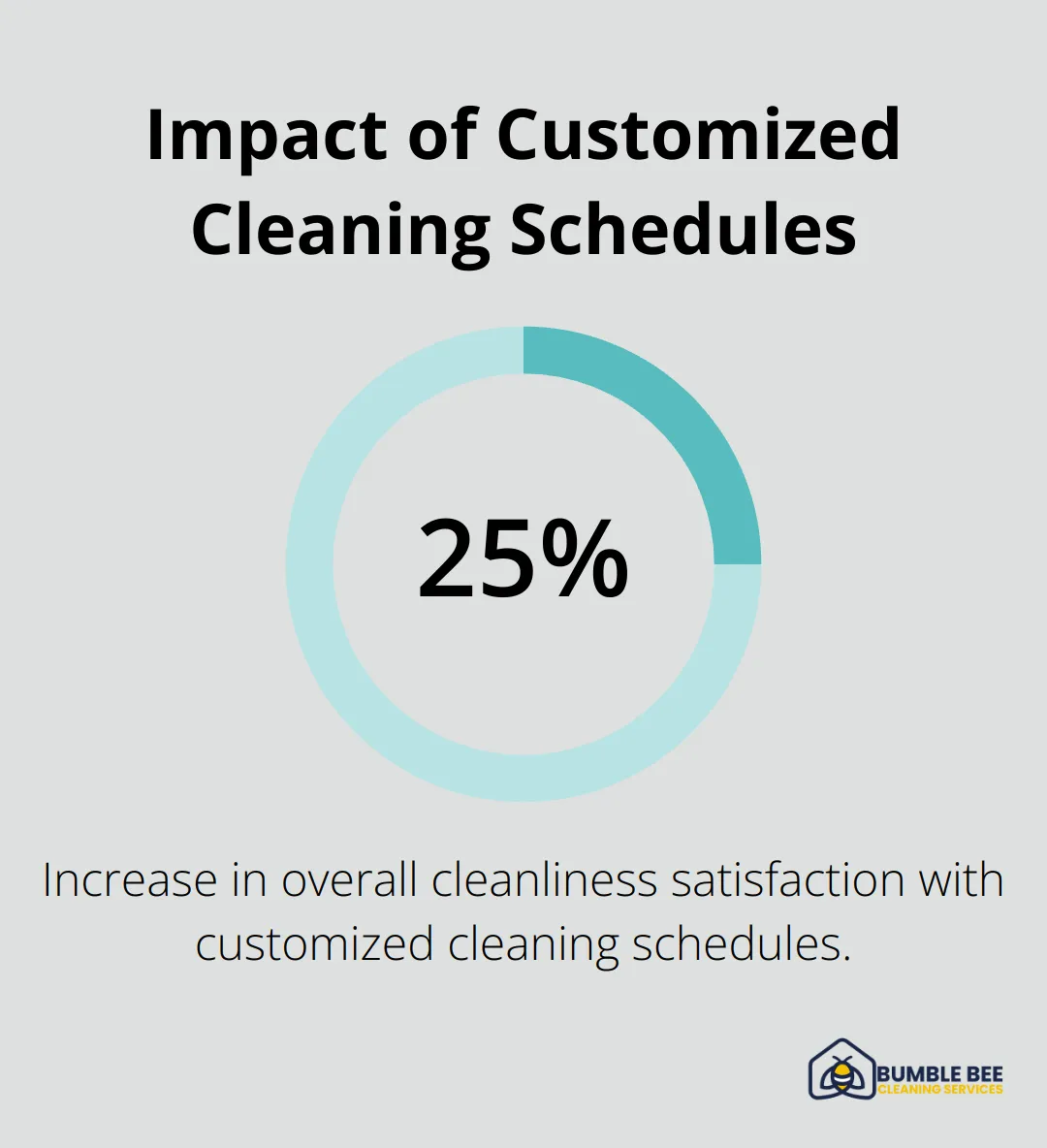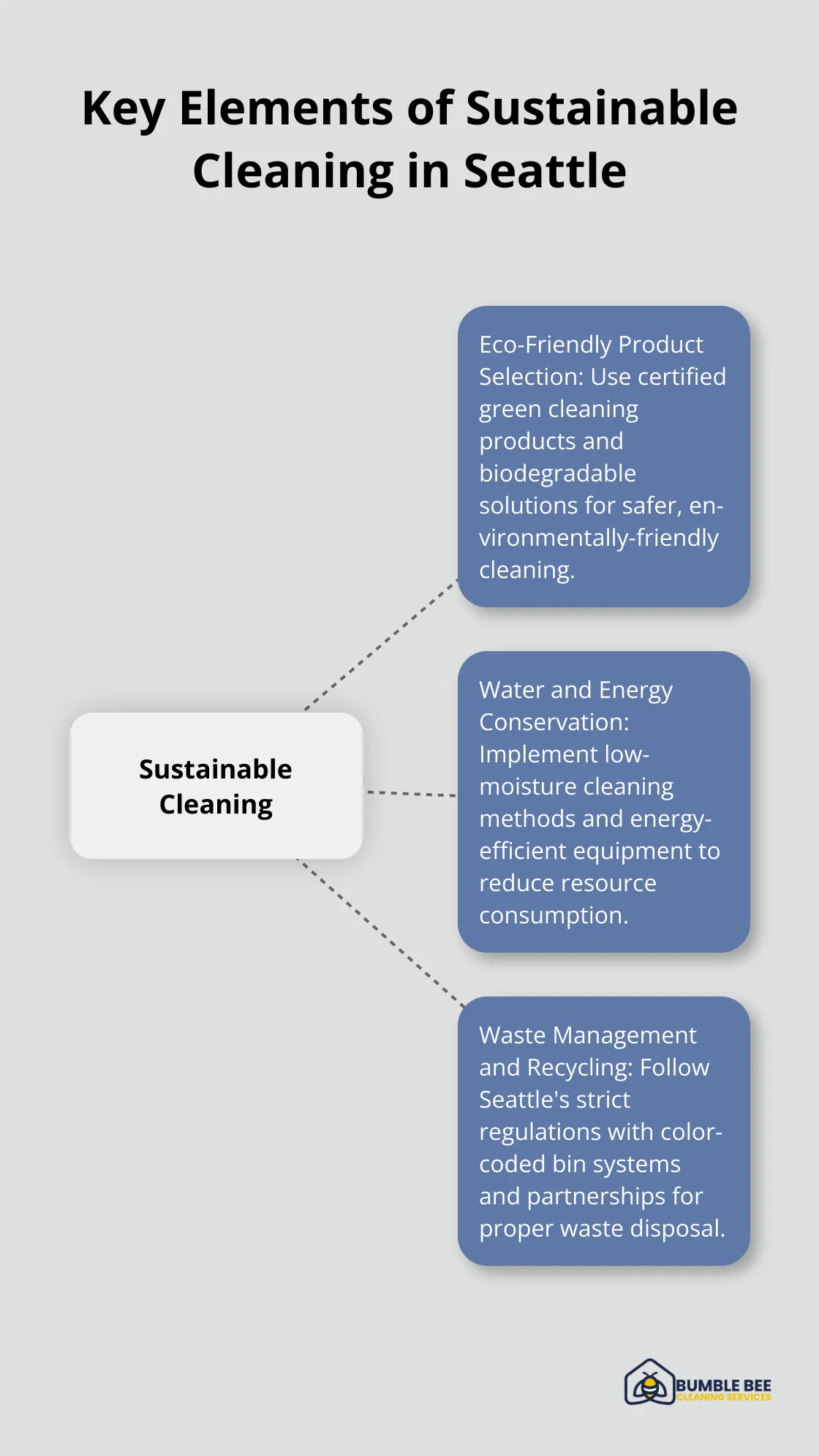At Bumble Bee Cleaning Services, we understand the unique challenges of janitorial management in Seattle’s diverse facilities. Our city’s climate, environmental standards, and business landscape demand specialized approaches to maintain cleanliness and efficiency.
This blog post explores effective strategies for managing janitorial services in Seattle, from staff training to sustainable practices. We’ll share insights to help facility managers optimize their cleaning operations and create healthier, more productive spaces for everyone.
Key Elements of Janitorial Management in Seattle
Seattle’s unique environment demands a tailored approach to janitorial management. Several critical elements contribute to effective cleaning strategies in our city.
Climate Adaptation
Seattle’s frequent rainfall and high humidity create specific challenges for facility maintenance. Moisture control prevents mold growth and maintains indoor air quality. We recommend:
- Use of dehumidifiers in problem areas
- Regular checks for water intrusion (especially from October to April)
Eco-Friendly Solutions
Seattle’s commitment to sustainability necessitates the use of environmentally friendly cleaning products. We suggest:
- Use of certified green cleaning products (meeting Green Seal or EcoLogo standards)
- Selection of biodegradable and non-toxic cleaning agents
Flexible Scheduling
Seattle’s diverse business landscape requires adaptable cleaning schedules. A study by the International Facility Management Association found that customized cleaning schedules can increase overall cleanliness satisfaction by 25%. Consider:
- More frequent cleaning for high-traffic areas in tech companies
- Specialized cleaning during off-hours for manufacturing facilities

Quality Control Measures
Implementing robust quality control measures maintains high standards. The Centers for Disease Control and Prevention (CDC) endorses ATP (Adenosine Triphosphate) testing for objective cleanliness measurements. This method detects the presence of organic matter that may not be visible to the naked eye.
Seattle-Specific Staff Training
Proper training of janitorial staff on Seattle’s unique cleaning needs is essential. This includes education on handling the city’s recyclable and compostable waste streams.
Technology Integration
Incorporating technology into janitorial management improves efficiency. Smart sensors alert cleaning staff to areas that need immediate attention, reducing unnecessary labor and improving overall cleanliness. A report by McKinsey & Company suggests that such IoT solutions can reduce cleaning costs by up to 20%.
These key elements ensure that janitorial management strategies in Seattle are both effective and aligned with the city’s unique requirements. A well-managed janitorial service not only maintains cleanliness but also contributes to the health, productivity, and sustainability of Seattle’s diverse facilities. The next section will explore how to effectively train and retain janitorial staff in Seattle’s competitive job market.
Building a Strong Janitorial Team in Seattle
Comprehensive Training Programs
A well-trained janitorial team forms the foundation of effective facility management. In Seattle’s competitive job market, companies must implement structured onboarding processes that cover Seattle-specific cleaning requirements (such as proper handling of compostable waste). Completion of CIMS and CIMS-GB has reduced employee turnover rates by improving training programs and incorporating best practices.
Continuous education keeps staff engaged and up-to-date. Regular workshops on new cleaning technologies and eco-friendly practices enhance skills and efficiency. For example, training on the proper use of electrostatic sprayers can improve disinfection efficiency by 50% (according to data from the Environmental Protection Agency).
Competitive Compensation and Benefits
Seattle’s tight labor market demands competitive wages to attract top talent. The Bureau of Labor Statistics reports that the average hourly wage for janitors in Seattle varies based on factors such as experience and specific job requirements.
Benefits packages play a significant role in employee satisfaction and retention. Health insurance, paid time off, and retirement plans can make a substantial difference. A survey by the National Association of Professional Employers Organizations found that companies offering comprehensive benefits packages have 26% lower turnover rates.
Creating a Positive Work Culture
A positive work environment extends beyond compensation. Regular team meetings, recognition programs, and clear career advancement opportunities boost morale significantly. The Society for Human Resource Management reports that companies with strong recognition programs have 31% lower voluntary turnover.

Mentorship programs allow experienced staff to guide newcomers, improving skill transfer and creating a sense of community within the team. This approach not only enhances job satisfaction but also promotes a culture of continuous learning and growth.
Technology Integration for Efficiency
Incorporating technology into janitorial operations improves job satisfaction by making tasks more manageable and efficient. Smart cleaning schedules can optimize routes and reduce unnecessary labor by up to 20% (according to a study by McKinsey & Company).
Mobile apps for task management and communication streamline operations and provide real-time feedback. This technology not only improves efficiency but also gives staff a sense of autonomy and responsibility, contributing to overall job satisfaction.
The next section will explore sustainable cleaning practices that align with Seattle’s environmental standards and contribute to the overall well-being of facility occupants.
Sustainable Cleaning in Seattle: A Practical Guide
At Bumble Bee Cleaning Services, we have observed the increasing demand for sustainable cleaning practices in Seattle. This shift creates healthier spaces and reduces operational costs. Let’s explore practical ways to implement sustainable cleaning in Seattle facilities.

Eco-Friendly Product Selection
The selection of appropriate cleaning products is essential. We recommend certified green cleaning products that can protect custodial staff and building occupants from exposure to chemicals that can cause asthma and other health issues. These products benefit the environment and provide safety for cleaning staff and building occupants.
When choosing products, consider pH levels. Neutral pH cleaners (around 7) offer gentler surface treatment and increased user safety. For more challenging tasks, select biodegradable degreasers and enzyme-based cleaners that effectively break down organic matter without harsh chemicals.
Water and Energy Conservation
Water conservation holds particular importance in Seattle, where abundant rainfall coexists with increasing water management challenges. Low-moisture cleaning methods, such as microfiber mops and cloths, can significantly reduce water usage compared to traditional mop-and-bucket systems.
For larger areas, auto-scrubbers with water recycling systems present a viable option. These machines can save a substantial amount of water compared to traditional methods, which significantly reduces a facility’s water footprint.
Energy conservation complements water savings. Energy Star certified cleaning equipment uses less energy than standard models. Day cleaning schedules can also reduce energy costs by minimizing the need for night-time lighting and HVAC usage.
Waste Management and Recycling
Effective waste management is critical in Seattle, where strict recycling and composting regulations exist. The Seattle Land Use Code SMC 23.54.040 requires solid waste container storage and access for all new and some remodeled buildings in Seattle. A color-coded bin system can simplify waste sorting. For example, blue for recycling, green for compostables, and black for landfill waste.
Staff training on Seattle’s commercial cleaning standards proves invaluable. Such local knowledge can significantly improve a facility’s waste diversion rates.
Partnerships with local recycling companies for hard-to-recycle items like electronics or hazardous waste offer additional benefits. Many provide pick-up services, which eases proper disposal and ensures compliance with local regulations.
Final Thoughts
Effective janitorial management in Seattle addresses unique challenges while prioritizing sustainability and employee well-being. Facility managers must understand Seattle’s specific cleaning needs, implement comprehensive schedules, and maintain rigorous quality control measures. These actions ensure consistently clean and healthy environments for businesses across the city.
Training and retaining skilled janitorial staff proves essential in Seattle’s competitive job market. Comprehensive training programs, competitive compensation packages, and a positive work culture attract top talent and foster long-term commitment. These elements contribute to excellence in service delivery and overall facility cleanliness.
At Bumble Bee Cleaning Services, we understand the intricacies of janitorial management in Seattle. Our team of experts provides top-notch cleaning solutions tailored to the unique needs of Seattle’s diverse facilities. We help create cleaner, healthier, and more productive spaces for businesses throughout the city.
